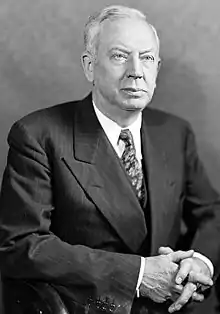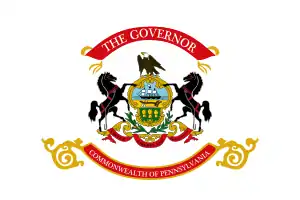Edward Martin (Pennsylvania politician)
Edward "Ed" Martin (September 18, 1879 – March 19, 1967) was an American lawyer and Republican party politician from Waynesburg, Pennsylvania. He served as the 32nd Governor of Pennsylvania from 1943 until 1947 and as a United States Senator from Pennsylvania from 1947 until 1959.
Ed Martin | |
|---|---|
 | |
| United States Senator from Pennsylvania | |
| In office January 3, 1947 – January 3, 1959 | |
| Preceded by | Joe Guffey |
| Succeeded by | Hugh Scott |
| Chair of the National Governors Association | |
| In office July 1, 1945 – May 26, 1946 | |
| Preceded by | Herbert Maw |
| Succeeded by | Millard Caldwell |
| 32nd Governor of Pennsylvania | |
| In office January 19, 1943 – January 2, 1947 | |
| Lieutenant | John Bell |
| Preceded by | Arthur James |
| Succeeded by | John Bell |
| 18th Treasurer of Pennsylvania | |
| In office January 15, 1929 – January 17, 1933 | |
| Governor | John Fisher Gifford Pinchot |
| Preceded by | Charles Snyder |
| Succeeded by | Sam Lewis |
| Chair of the Pennsylvania Republican Party | |
| In office May 12, 1928 – June 9, 1934 | |
| Preceded by | William Mellon |
| Succeeded by | Harvey Taylor |
| 23rd Auditor General of Pennsylvania | |
| In office January 20, 1925 – January 15, 1929 | |
| Governor | Gifford Pinchot John Fisher |
| Preceded by | Sam Lewis |
| Succeeded by | Charles Waters |
| Personal details | |
| Born | September 18, 1879 Ten Mile, Pennsylvania, U.S. |
| Died | March 19, 1967 (aged 87) Washington, Pennsylvania, U.S. |
| Political party | Republican |
| Spouse(s) | Mary Scott (1909–1967) |
| Children | 3 |
| Education | Waynesburg University (BA) |
| Military service | |
| Allegiance | |
| Branch/service | |
| Years of service | 1898–1942 |
| Rank | |
| Unit | 28th Infantry Division |
| Battles/wars | Spanish–American War Border War World War I World War II |
Biography
Martin was born at Ten Mile, Pennsylvania in 1879. He attended public schools and graduated from Waynesburg College in Waynesburg, Pennsylvania, in 1901. He studied law, was admitted to the bar in 1905 and commenced practice in Waynesburg. He served in the Spanish–American War, in the Mexican Border Expedition, and in the First and Second World Wars. He was a burgess of East Waynesburg from 1902 to 1905, solicitor of Greene County from 1908 to 1910 and again from 1916 to 1920. He served as auditor general of Pennsylvania from 1925 to 1929 and State treasurer from 1929 to 1933. He chaired the Republican State Committee of Pennsylvania from 1928 to 1934.[1][2] He was adjutant general of Pennsylvania from 1939 to 1943, and commander of the 28th Infantry Division from 1939 to 1942. He was also president of the National Guard Association of the United States in 1940. He had varied business interests, including fire insurance, oil and gas, and banking.
Martin was elected Governor of Pennsylvania in 1942. He served as president of the Council of State Governments in 1946 and was elected as a Republican to the United States Senate in the same year. In 1947, Martin received the American Legion's Distinguished Service Medal.[3] Martin was re-elected to the Senate in 1952. During the Eighty-third Congress from 1953 to 1955, when the Republicans were in the majority, he was chairman of the Committee on Public Works. Martin voted in favor of the Civil Rights Act of 1957.[4] Martin did not seek re-nomination to a third term in 1958. He died in Washington, Pennsylvania, in 1967 and is buried at Greene Mount Cemetery in Waynesburg.
Fort Indiantown Gap
Before entering public life, Martin served as a general in the United States National Guard. Martin was prominent in the development of Fort Indiantown Gap and after his death, the United States Senate renamed the facility the Edward Martin Military Reservation, a designation that Martin himself had rejected throughout his life. The new name was never fully accepted by the military personnel who served there. In 1975, the Secretary of the Army renamed the post Fort Indiantown Gap in order to more closely align it with the other active duty stations throughout the United States. The Joint Force Headquarters of the Pennsylvania National Guard is located at Fort Indiantown Gap, and is named Edward Martin Hall in Martin's honor.
Edward Martin Memorial Library at NGAUS
The Library at the National Guard Association of the United States (NGAUS) is dedicated to Martin and is named the Edward Martin Memorial Library. While not a circulating library, it serves as one of the foremost collections of National Guard documents and is ideal for researchers. Original volumes include a complete collection of NGAUS Conference minutes dating to 1879 and Adjutant General (TAG) Reports dating to the early 20th Century. The Library may be found in the National Guard Memorial Building, One Massachusetts Ave., NW, Washington DC 20001. The Edward Martin Memorial Library is managed and maintained by the National Guard Educational Foundation (NGEF).
References
- Armstrong, Robert B. (May 12, 1928). "Mellon to Get Keystone Vote". Los Angeles Times. Retrieved January 9, 2012.
- Townley, John B. (June 8, 1934). "Martin Gives Up Chairman Post, Recommends Taylor". Pittsburgh Press. Retrieved January 9, 2012.
- http://www.legion.org/distinguishedservicemedal?page=7
- "HR. 6127. CIVIL RIGHTS ACT OF 1957". GovTrack.us.
- United States Congress. "Edward Martin (id: M000177)". Biographical Directory of the United States Congress.
| Political offices | ||
|---|---|---|
| Preceded by Sam Lewis |
Auditor General of Pennsylvania 1925–1929 |
Succeeded by Charles Waters |
| Preceded by Charles Snyder |
Treasurer of Pennsylvania 1929–1933 |
Succeeded by Sam Lewis |
| Preceded by Arthur James |
Governor of Pennsylvania 1943–1947 |
Succeeded by John Bell |
| Preceded by Herbert Maw |
Chair of the National Governors Association 1945–1946 |
Succeeded by Millard Caldwell |
| Party political offices | ||
| Preceded by William Mellon |
Chair of the Pennsylvania Republican Party 1928–1934 |
Succeeded by Harvey Taylor |
| Preceded by Arthur James |
Republican nominee for Governor of Pennsylvania 1942 |
Succeeded by Jim Duff |
| Preceded by Jay Cooke |
Republican nominee for U.S. Senator from Pennsylvania (Class 1) 1946, 1952 |
Succeeded by Hugh Scott |
| Military offices | ||
| New office | Commanding General of the 28th Infantry Division 1941 |
Succeeded by Garesche Ord |
| U.S. Senate | ||
| Preceded by Joe Guffey |
United States Senator (Class 1) from Pennsylvania 1947–1959 Served alongside: Francis Myers, Jim Duff, Joseph Clark |
Succeeded by Hugh Scott |
| Preceded by Dennis Chávez |
Chair of the Senate Public Work Committee 1953–1955 |
Succeeded by Dennis Chávez |

